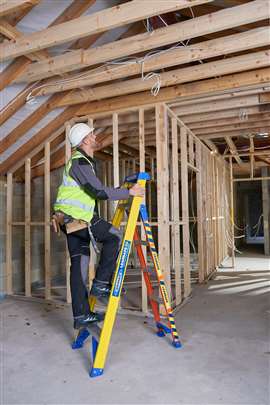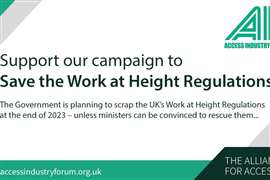Fears remain for working at height laws
04 July 2023
The UK government has scrapped plans to review or repeal all laws which includes the Working at Height Regulations 2005 (WAHR), but WernerCo warns there could still be uncertainty over the future of these important regulations.
WAHR are among a range of laws set during the UK’s membership of the EU, that were set for repeal. Access equipment manufacturer WernerCo, which produces Werner, BoSS and Zarges brands, said it is important to emphasise how vital these regulations are.
 Photo: WernerCo
Photo: WernerCo
Following Brexit, the government announced that EU-era laws would expire as of 31 December 2023, inclusive of the WAHR.
In May, the government announced that it was changing its approach to the sunsetting of EU Retained Laws. As a result of this change it was also confirmed that the WAHR are not set to be repealed in December 2023 as was initially planned. However, while, there is no imminent threat to them, reforms could lie ahead, says WernerCo, which leaves them at risk of being diluted or revoked at a later date; affecting the 10 million plus people who are estimated to work at height in the UK.
Fall from height fatalities
The UK’s Health and Safety Executive (HSE) reports that the most common cause of fatalities at work is falls from height. Between 2021 – 2022 of the 123 work-related injuries that lead to a fatality in the UK, 29 of them were a consequence of falling from height.
A 2019 inquiry from the All-Party Parliamentary Group (APPG) for Working at Height found that since the introduction of the regulations, the UK has had some of the lowest fatality and injury rates in the European Union.
On the subject of EU Retained Laws, Dave Elson, compliance manager at WernerCo, added, “Whilst only a small remainder of these laws are due to sunset on this date, excluding WAHR, it leaves questions around their future. Potentially meaning a revocation at a later date, or the replacement of regulations with less water-tight legislation.
“This could result in unclear guidance for employers and those in control of workers who are working at height, which could mean a higher risks of accidents and a lack of accountability in some circumstances.
“Without them at all, employees would be left vulnerable given the relaxation of guidance and lack of legal obligations concerning their employers. For this reason, it is essential the industry works together to ensure the regulations remain and continue to protect those who work at height.”
STAY CONNECTED



Receive the information you need when you need it through our world-leading magazines, newsletters and daily briefings.
CONNECT WITH THE TEAM













